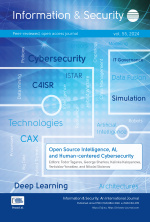MAPWEB: Cooperation between Planning Agents and Web Agents
Source:
Information & Security: An International Journal,Keywords:
Agent Architecture, Information System, Intelligent Agents, Multi-Agent Systems, Planning, Web AgentsAbstract:
The paper presents MAPWEB (Multi-Agent Planning on the Web), a multi-agent system for cooperative work between different intelligent software agents whose main goal is to solve user planning problems using the information stored in the World Wide Web (WEB). MAPWEB is made of heterogeneous mixture of intelligent agents whose main characteristics are cooperation, reasoning, and knowledge sharing. The architecture of MAPWEB uses four types of agents: UserAgents that are the bridge between the users and the system; ControlAgents (Manager and Coach Agents) that are responsible for managing the rest of the agents; PlannerAgents that are able to solve planning problems; and, finally, WebAgents whose aim is to retrieve, represent, and share information obtained from the WEB. MAPWEB solves planning problems by means of cooperation between PlannerAgents and WebAgents. Instead of using the PlannerAgent to solve the whole planning problem, the PlannerAgent focuses on a less restricted (and therefore easier to solve) problem (what we call an abstract problem) and cooperates with the WebAgents to validate and complete abstract solutions. In order for cooperation to take place, a common language and data structures have also been defined.
